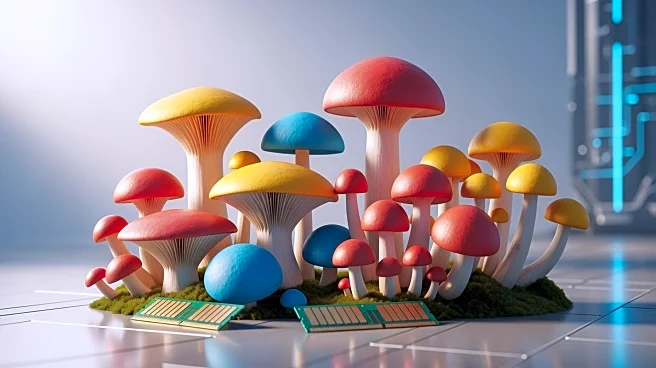What's Happening?
Researchers at The Ohio State University have discovered that common edible mushrooms, such as shiitake, can be used as organic memristors, a type of data processor capable of remembering past electrical
states. These mushroom-based devices demonstrated memory effects similar to semiconductor chips and offer a low-cost, environmentally friendly alternative for computing components. The study highlights the potential of fungal networks in bioelectronics, a field that could revolutionize next-generation computing materials. The research, published in PLOS One, suggests that mushrooms could minimize electrical waste and reduce reliance on rare-earth minerals, offering a sustainable solution for computing systems.
Why It's Important?
The use of mushrooms as memory chips represents a significant advancement in sustainable technology, potentially reducing the environmental impact of computing systems. This innovation could lead to more eco-friendly data processing solutions, addressing concerns about electronic waste and resource depletion. The ability to develop biodegradable computing components aligns with growing societal awareness of environmental preservation. If scaled, fungal computing could transform industries reliant on data processing, offering economic advantages through reduced energy consumption and material costs. This research underscores the importance of exploring natural resources for technological advancements.
What's Next?
Future research will likely focus on optimizing the production process of fungal memristors, including improving cultivation techniques and miniaturizing devices for practical applications. The scalability of mushroom-based computing systems could be explored for use in edge computing, aerospace exploration, and enhancing autonomous systems. Researchers may also investigate the integration of fungal electronics into wearable devices, expanding their potential applications. Continued innovation in bioelectronics could lead to breakthroughs in sustainable computing, influencing industry standards and practices.
Beyond the Headlines
The development of mushroom-based memory chips raises questions about the intersection of technology and nature, challenging traditional views on computing materials. This approach may inspire ethical discussions on the use of living organisms in technology and the implications for biodiversity. The research could also influence cultural perceptions of fungi, highlighting their potential beyond culinary uses and fostering appreciation for their ecological contributions.










